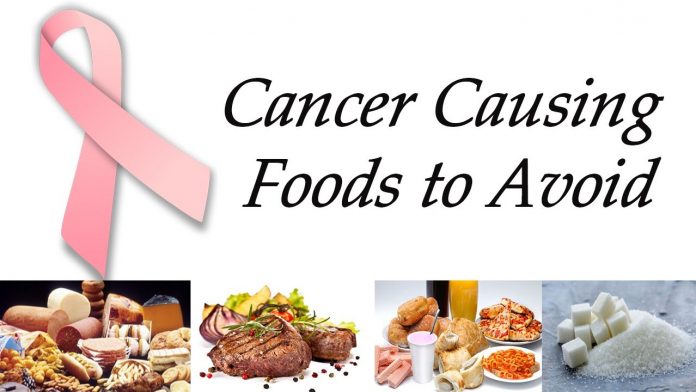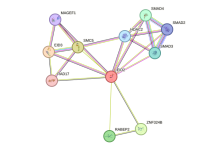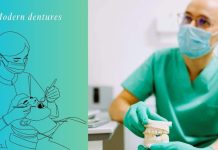Five Foods to Avoid From Cancer
Who isn’t afraid of the word “cancer”? We all know a family member or a friend who had it. And indeed, according to the American Cancer Society, more than one million people in the United States get cancer each year. The American Cancer Society lists many possible causes of cancer disease. The list includes genetic factors, lifestyle factors such as tobacco use, diet, and physical activity, certain types of infections, and environmental exposures to different types of chemicals and radiation.
Since I’m very interested in healthy nutrition, and foods that protect against cancer development. But it won’t help if we eat those foods while consuming large amounts of other foods that can increase the risk of cancer. So let’s have a look at these cancer-promoting foods so we all know not only what to eat, but what NOT to eat (or at least reduce their intake). Here is the list of Five Foods to Avoid From Cancer.
1. High Intake of Processed Foods
Many diverse substances are adjoined to commercially prepared foods, such as artificial colors, chemical flavors, salt, sugar, or artificial sweeteners. These additives are frequently investigated by researchers to check if any of them is thought to be a real risk. Sometimes there is a scare about a particular additive and some additives are thought to be a cancer risk. Heavily salted, smoked, and pickled foods, for example, may increase the risk of stomach cancer.
This may well explain why there is a high rate of stomach cancer in Japan because salty and pickled foods are very popular. Also, an epidemiological study published in June 2010 in the American Journal of Clinical Nutrition observed that high-salt food can increase by 10% the risk of stomach cancer.
Furthermore, artificial food coloring is noticed to numerous health risks. Research has been limited to animal studies, including mice and rats. But some claim that these dyes are possibly toxic enough to cause cancer in humans.
2. High intakes of red meat, processed meat, or charred food
It has been observed that people who eat lots of red processed meat can cause bowel and stomach cancer. Red meat includes all fresh, minced, and frozen beef, pork, lamb, or veal, particularly pork is so injurious to health and leads to cancer. Therefore processed meats possess a risk of cancer, and these have been preserved in some way other than freezing and include bacon, ham, salami, sausages, corned beef, black pudding, pâté, and tinned meat.
When you eat processed meats, you are exactly assured of consuming sodium nitrite or sodium nitrate. Which are added to processed and cured meats to preserve color and extend shelf life? Unluckily, these compounds can be converted to nitrosamine, which is very much famous to cause cancer in laboratory rats (though again, the connection in people is unclear).
Also, hot dogs, bacon, and the like may also be preserved by methods involving smoke or salt, which also increases the exposure to potentially carcinogenic chemicals. Charred food creates chemicals that can damage human cells, and make them more likely to become cancerous. However; it highly depends on the way you cook your meat can potentially make a big difference in the cancer risk it poses to you.
The char-grilled meats that are somewhat burnt on the outside are among the worst foods that increase the risk of cancer.
3. Sugar
There are a number of websites that encourage the idea of sugar “feeding” cancer. They suggest that eating foods with sugar makes cancer breed faster. Due to this some cancer patients avoid eating any sugar and reject beneficial foods, i.e. fruits, that contain vital nutrients. Therefore no decisive research on human subjects to verify that sugar makes cancerous cells grow.
Avoiding foods with processed sugar is a decent idea in general, but disregarding foods with natural sugar won’t stop cancer cells from dividing. As per Mayo Clinic, sugar doesn’t make cancer grow faster. All cells (including cancer cells) depend on blood sugar (glucose) for instant energy.
But giving extra sugar to cancer cells doesn’t speed their growth. Similarly, depriving cancer cells of sugar doesn’t slow their growth. According to the Canadian Cancer Society, the connection between sugar and cancer is different, eating an abundance of sugary foods can cause rapid gaining weight. Research shows that obese habits or being overweight can increase the risk of cancer.
Normally obesity may cause changes in hormone levels or insulin that might increase the risk of developing breast, colon, or uterine cancer. Thus limiting the sugar level in your diet is really important. High sugar in your diets sugar and refined carbohydrates can lead to overweight and obesity, which indirectly increases cancer risk over time. Sugar can be found in several foods such as cookies, sodas, cakes, soft drinks, and other sweets even in pasta sauce, salad dressing, and canned vegetables.
So you’ve to read out food labels carefully, look for sugar as the first ingredient and be aware of hidden sugar names: fructose, lactose, sucrose, maltose, glucose, and dextrose. Natural sugars such as molasses, honey, and maple syrup contain beneficial antioxidants but those, too, should be consumed in moderation. If you tend to have sugar cravings, you may want to read my article 13 effective ways to quit sugar.
4. Fried food, French fries, potato chips, and snack food
It is highly important that French fries, potato chips, and other snacks you eat, actually may have high levels of acrylamide, another carcinogenic substance that forms when foods are heated at high temperatures, such as during baking or frying. Acrylamide may be gotten in any food heated to a temperature above 250° F, but potato chips & French fries have been observed highest levels among foods tested.
Therefore cooking methods i.e. frying, baking, or roasting are more likely to produce acrylamide, whereas boiling, steaming, and microwaving appear less likely to do so. Longer cooking times and cooking at higher temperatures can raise the amount of acrylamide in foods further.
It is most important to mention here, that prolonged exposure to acrylamide has caused a range of tumors in animal tests (rats and mice), whereas most of the human studies published so far have failed to find any connection between acrylamide and several types of cancers.
Therefore many believe it has the potential to be a human carcinogen because of those animal studies. If you are still worried, the FDA and other public health groups suggest the best way is to follow the general advice on healthy eating, including limiting the consumption of fried and fatty foods. Another component found in these types of foods that may increase the risk for cancers is Trans fats or trans fatty acids.
These are formed when manufacturers turn liquid oils into solid fats via a process called hydrogenation. And indeed, Tran’s fats can be found in many foods including vegetable shortening, margarine, crackers, cereals, candies, baked goods, cookies, granola bars, chips, snack foods, salad dressings, fried foods, fats, and many other processed foods.
Tran’s fats cannot only increase your risk of cardiovascular disease and two types of diabetes, but the high intake of trans-fatty acids may have a direct association with prostate cancer in men, which ranks number one among the most common malignant cancers in American men. Chronic inflammation plays an important role in the development of prostate cancer and the association of trans-fats and chronic inflammation may explain the link between prostate cancer and trans-fatty acid ingestion. However, further studies and clinical trials are needed to establish this fact.
5. Excess alcohol
Scientists and researchers have a strong consensus on the link between alcohol drinking causing several types of cancer. People who drink alcohol regularly could be at a high risk of developing alcohol-related cancer. According to Cancer Research UK and the American Cancer Society, alcohol can increase the risk of cancers, like mouth cancer, liver cancer, breast cancer, bowel cancer, and throat cancer.
You have perhaps heard about other studies that have found that certain substances in red wine, such as resveratrol, have anti-cancer properties, but like several things in life, moderation is the key. The nutrition guidelines suggest physical activity plays a key role in cancer prevention; people, who drink alcohol, have a high risk of cancer.

Product You May be Interested
-
Crush Food Cravings with Odd Water Hack and Melt 62lbs
-
Flavor Pairing Ritual Supercharges Women’s Metabolisms
-
The best Keto Diet Program






